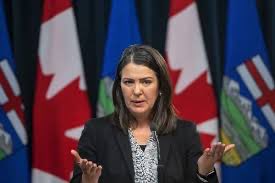AIR QUALITY
Alberta Burns Due To Climate-Change Fueled Wildfires, Yet Provincial Government & Media Refuse To Mention It
My heart is with the Albertans who are displaced by these terrible fires. But my heart is not with the fossil industry of Alberta and its enablers.

DALL·E generated image of a forest made of oil drilling rigs burning, digital art
By Michael Barnard
CLEAN TECHNICA May 8,2023
At present, roughly 25,000 people have been evacuated from multiple communities in Alberta, Canada. The province just declared a state of emergency. The press is full of stories about the wildfires. The Premier, Danielle Smith, said “I don’t know that I ever recall seeing multiple communities evacuated all at once in fire season.”
What didn’t she say? That the western Canadian droughts that have been fanning wildfire flames for years are caused by climate change. That the mountain pine beetle, which kills pine trees and turns once-thriving pine forests — whether real or replanted — into tinder, has extended its range into northeastern Alberta due to climate change. Or that Alberta’s fire season was longer and more severe due to climate change.
She was willing to say that in her 50-odd years on the planet and in the province, this seems a mite unusual. Why it’s unusual? Couldn’t say. Alberta’s press is full of quotes like that. Words like unprecedented are being thrown around like pancakes at the Stampede, but the words climate change are missing in action.
And, of course, she didn’t mention that Alberta’s oil and gas industry is a major contributor to global warming. Canada’s oil and gas industry, which is dominated by Alberta with 80% of oil and 63% of natural gas, is an outsized contributor, with full lifecycle for all domestic production, domestic consumption and foreign consumption being about a billion tons of CO2 per year. Only 36.8 billion tons of CO2 were emitted globally in 2022, and Alberta’s oil and gas industry is responsible for about 2% of it by itself.
As I noted recently, Canada’s current social price of carbon of $261 per ton of CO2e puts the price tag for negative externalities from our fossil fuels at about C$250 billion a year against C$165 billion in oil and gas industry revenues. That’s a global cost of each ton of carbon, not the cost borne locally, but I suspect the 25,000 people who have been evacuated and fear that their homes will end up like the ones in Fort McMurray in 2016 or Lytton, BC in 2021, are feeling as if they are personally paying the entire price, as are the more than a million people breathing smoke today
But surely this was an oversight by the Premier? Well, no. The only time Smith mentions climate change is when she is attacking the federal government’s policies to address it. I spent some time reading quotes from her in articles this morning, and she never says it’s real, it’s serious, and it’s caused by us, or any variant thereof, but does spend a lot of time attacking Prime Minister Justin Trudeau and the Liberal Party of Canada for targeting Canada’s oil and gas sector.
You might remember that Trudeau’s government bought the failing Trans Mountain Pipeline and committed to tripling its capacity to deliver Alberta’s product to water, a project that’s quadrupled its budget from original estimates to C$30.9 billion so far. And you might remember that during COVID-19, Trudeau’s government gave C$18 billion in subsidies, relief, and grants to the oil and gas industry in 2020 alone.
Yes, with enemies like that, who needs friends?
And with enemies like that, it’s remarkable how well Trudeau being Satan incarnate and his administration hating fossil fuels plays in Alberta. Remember, the entire industry’s annual revenue was $165 billion. That $18 billion represents 11% of that number.
Canada’s oil, gas, and coal rents — the percentage of GDP that they contribute — are only 1.7%, and are centered in a province that almost never elects Liberal members of Parliament, yet the Trudeau administration propped them up by 11%. And the province’s Premiere keeps attacking him for alleged sins against the industry. It’s remarkable that Smith can keep a straight face or that anyone in the province thinks this is reasonable rhetoric.
I wonder why that is? After all, the glaringly obvious links between climate change and the wildfire emergency must be getting lots of coverage in local press, right? Well, no.
I searched all four of the biggest papers for the past week for any mention of wildfires and climate change. Those outlets were the Calgary Herald, Edmonton Journal, Edmonton Sun, and Calgary Sun. They all had a lot of coverage on wildfires, typically three stories on their front pages.
But what about wildfire stories that included the phrase climate change? Well, none of the front page stories included it. In fact, I only found two articles from the last week that mentioned climate change and wildfires. One was in the Calgary Herald long reads section about warnings to Calgary’s city council that the future was going to be smokey regularly due to increased wildfires. The other was in the long reads section of each paper, an article written by journalist Bill Kaufman, which included a single person’s perspective that included climate change, Mike Flannigan, research chair for Predictive Services, Emergency Management and Fire Science at Thompson University, and author of the study linked in the second paragraph making it clear that climate change was extending Alberta’s fire season.
What the heck is one article doing in four papers that are otherwise almost entirely ignoring the links between climate change, the province’s major industry, and wildfires? Well, they are all owned by Postmedia, a media conglomerate that owns virtually all the newspapers of any size in Canada except the longstanding national newspaper, the Globe & Mail. And Postmedia is a very conservative, very corporate friendly, very oil and gas friendly corporation.
Postmedia and its publications love to publish climate change denial. Actual information about climate change and its connection to Canada’s oil and gas industry? Not so much. So two articles buried in the long reads section of the four big papers in the last week that mention that climate change has something to do with it is par for the course.
Is it any wonder that large swaths of Alberta’s populace think the federal government hates Alberta and is trying to kill the goose that lays the egg-shaped tarballs? Or that Smith gets off scot-free for not mentioning the linkage between wildfire, climate change, and the provincial industry? Is it any wonder that only 42% of Alberta’s citizens, as of 2019, believed that there was any linkage between climate change and human actions?
Is it any wonder that the one good government Alberta has had in the past 40 years, Rachel Notley’s NDP, the government responsible for shutting down Alberta’s coal electrical generation as part of the only government to have a remotely credible climate plan, scraped into office after an even worse provincial Conservative administration than usual and a divided right-wing, and only lasted one term? Or that Notley and the NDP are only 50% likely to win an election against Smith and the UCP (the latest incarnation of Alberta’s conservatives), despite their climate change silence or outright denial, completely baseless attacks on the federal government, completely farcical constitutional statements about Alberta’s sovereignty, and cozying up to the worst of Alberta’s COVID-19 deniers, including attempts to get charges against the idiots who blockaded the border dropped.
No, it’s not a wonder. What is a wonder is that Albertans are actually Canadians, which usually means good things for basic civic competence and alignment with empirical reality. Alberta has been sucking at the increasingly toxic teat of the US right over the past several years, with our Albertan-heavy COVID ‘protests’ featuring Trump and Confederate flags as prominent features, and only Alberta’s border-crossing blockade involving hidden guns and body armor to enable a thankfully thwarted plot to murder RCMP officers.
My heart is with the Albertans who are displaced by these terrible fires. My heart is with Albertans choking on the smoke that is becoming a dominating feature of western Canadian summers, even on Vancouver Island, 40 kilometers into the Pacific Ocean. My heart is with Alberta’s children, growing up thinking this is somehow remotely normal, and whose current events curriculum includes climate change denial and with climate change swept under the carpet. But my heart is very much not with the oil and gas industry of Alberta, with Alberta’s current Premiere and her UCP cohort, or with Postmedia.

 $330,000,000 to a BILLIONAIRE to buy a hockey arena
$330,000,000 to a BILLIONAIRE to buy a hockey arena
 $0 to help Alberta fight wildfires
Priorities Matter.
Danielle Smith is UNTRUSTWORTHY
$0 to help Alberta fight wildfires
Priorities Matter.
Danielle Smith is UNTRUSTWORTHY $330,000,000 to a BILLIONAIRE to buy a hockey arena
$330,000,000 to a BILLIONAIRE to buy a hockey arena
 $0 to help Alberta fight wildfires
Priorities Matter.
Danielle Smith is UNTRUSTWORTHY
$0 to help Alberta fight wildfires
Priorities Matter.
Danielle Smith is UNTRUSTWORTHY







